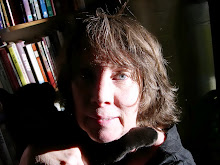It's Like Home-coming

When I knocked on the door only a weak voice answered, but it said "come in". So I did.
There on the bed, wrapped completely in a brown, tattered blanket, only her glowing brown eyes peering out from a very pale face, she lay. I introduced myself "the woman from the bookstore", not sure she would remember me. Whether she remembered me or not, she seemed happy to have company, and immediately asked if I could help her with her clothing and bathroom needs.
She was very frail; skeletal from the thin breasts upward, her arms like sticks. Her belly was swollen beyond what seemed possible; her legs too were swollen. Advanced liver disease, perhaps cancer...she hadn't seen doctors in a long while.
When I helped her from the bed I could see the print of my hands pressed into her swollen flesh.
The tangible comforts were important, the little things. To get from the bed to the bathroom, to have her face bathed, to have a clean shirt. I did what I could, that first day, but mostly I listened to her stories. And day after day, between the practical matters, we talked.
She had been a dancer when we were both young. We had children of about the same age; they tumbled about in the grass at festivals where she danced and I passed out peace petitions, years and years ago. They came to the bookstore and read books together.
She had two sons. One was killed in a drug deal gone wrong, years ago. He was just young, barely needing to shave that fair face. She told me she knew from the start that he would die, she just didn't know how or when or how to protect him. His color was orange, she told me, glowing orange. Hers, she said, was midnight blue.
I listened. I rocked her in my arms when the pain was bad. I tried to get help for her. She had rejected Hospice care and she was afraid of doctors and she said she had so much money she could stay in that tiny motel room for years and years and years.
Though she was afraid the owner might notice she was dying.
I told her my first job in the region had been at this very motel; I cleaned the rooms each morning then; it was the only job available. It's like homecoming, I told her, and she laughed with me.
Her life had been a hard one; she told me stories of abuse and stories of loss and stories of pain. She hadn't spoken to her surviving son for years, though he was only a few miles away. I tried to make a bridge for them, but I failed.
The last day I spent with her, coaxing her to take some spoonfuls of pomegranate yogurt (her favorite), she suddenly looked up at me with those beautiful sherry colored eyes and said "you were the best thing to ever happen to John".
"well, I did love him" I said, smiling at the thought of the father of my first son, 25 years older than I, such a charming and eccentric soul.
"He loved it that you loved him" she said. I smiled. And she said "you know, when he was flirting with everyone at the bars and at the parties...I want you to know, we always had your back, sister."
And there we sat in that tiny motel room, the sunlight coming through the window I'd opened, thinking back over the decades. John's been dead...can it be six years already? He made it to his 80's and died with a curious soul, telling me his only regret was that he had not spent more time concerned with poetry and less concerned with money.
Ah, she was such a dancer, so delicate. She made you believe she could fly. She was part of a circle of friends who founded a still performing dance group--they choreographed vast dramas, they taught children, they brought joy. She had not kept dancing, not after the death of her son, not after her addictions shook her soul, not after jail and accidents and betrayal.
But I sent word to the women who had danced with her, and they came to talk with her, to love her, to recognize her in those last days.
We talked of flowers and of Welsh poetry. Someone smuggled in some liquor and she asked me to mix her some drinks, just a day or so before she died. I took orange juice and tequila and ice, per her instructions, and did my best. "It's not good for you" I felt bound to say. She flashed a wicked grin and said "I can tell you are no drinker; pour in a bit more tequila please."
I did.
I woke one early morning with anxiety dark on my heart. It didn't go away as I started the day, and when I was able I took a moment, went shopping for fruit and yogurt, and hurried to her room.
The police were there already, with the coroner. I introduced myself and asked if I could stay with her a little, even though she had died in the early morning. I told her how brave she was, how beautiful she was, how I had enjoyed this time with her clear and beautiful soul. It's okay now, I said. It's all okay now.
The police offered their condolences. I gave them her son's contact information and what other strands of information I had. She was a beautiful, beautiful dancer, I said.
There wasn't much more to say. I brushed her thin hair back from her face and said "we'll meet again, don't worry, my dear. "


